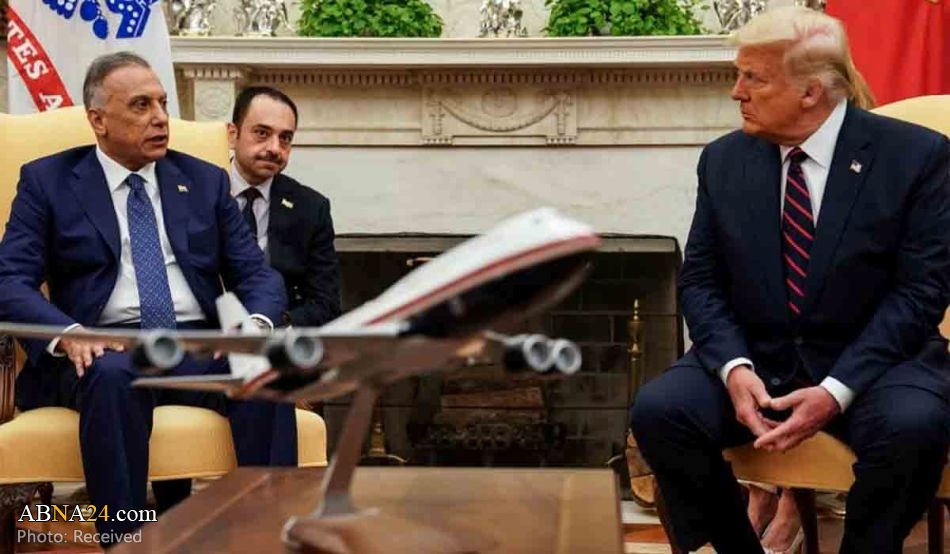AhlulBayt News Agency (ABNA): In his address on Tuesday marking the 100th anniversary of the Iraqi army foundation, the Iraqi Prime Minister Mustafa al-Kadhimi brazenly pointed to the retreat of the US forces from the country. Al-Kadhimi noted that the aim of the strategic talks with Washington was the exit of the American forces from the country and promised that over half of them will leave in the coming days.
Two points are worth mentioning regarding the recent remarks by al-Kadhimi. First, the PM is well aware that the demand of the Iraqi public is the expulsion of the Americans from Iraq and so plans to make this announcement to win legitimacy and political position boost in the future. Second, the remarks come as in the recent days, comments made by al-Kadhimi’s advisor Hesham Davoud in an interview with the BBC news about the role of the top Iranian General Qassem Soleimani trigged controversies and reactions. Although the PM suspended his advisor, his remarks seem to be a sequel to the severe reactions against Davoud’s comments.
Still, his promise of the exit of the US troops from the country to a large extent invites to doubt. Actually, al-Kadhimi needs to show his genuine will to the political parties and people of Iraq by taking practical actions or provide reliable documents vindicating his claims about the pullout. To fact-check his comments, we can refer to two points in this regard.
Government is passive in implementing the parliament’s expulsion bill
Since taking the post on May 7 last year, al-Kadhimi with his actions showed that not only he has not taken any steps towards implementing the foreign troops expulsion law, approved by the lawmakers two days after the assassination of Quds Force commander General Qassem Soleimani and Iraqi Popular Mobilization Forces (PMF) Deputy Commander Abu Mahdi al-Muhandis, but also he does not support the idea.
This is obvious from comments made by officials in his cabinet. Defense Minister Juma Anad Saadoun during a speech at the Iraqi army foundation’s 100th anniversary emphasized what he called a need for the Western forces to stay in his country to support Iraqi military centers, ignoring a demand by the lawmakers to as soon as possible expel the foreign forces from Iraq.
These contradictory stances have a record in the past, showing dishonesty of the al-Kadhimi about his serious efforts to force towards the start of the exit process.
For example, in November last year, Iraq’s Foreign Minister Fuad Hussein very openly affirmed that the so-called US-led anti-terror international coalition continues its activities in Iraq in coordination with Baghdad.
Non-transparency in the US forces withdrawal timetable and the number of the troops
In the past months, al-Kadhimi cabinet officials several times talked about the agreement with the US government for an exit timetable. In the second round of Washington-Baghdad strategic talks, Washington said that by end of 2020, its 5,200 operating forces in Iraq will be cut to 3,000. The cutting will come in three phases.
Hussein in November had said during negotiations between al-Kadhimi and the US Secretary of State Mike Pompeo, it was agreed that more 500 troops will leave Iraq. The Department of State confirmed his comments, saying that by mid-January 2021, the US forces will be cut to 2,500.
On the ground, there are no precise figures about the number of withdrawn troops. Even the veracity of videos depicting the exit of the troops is seriously questionable. Even worse, the Americans move regularly between northern Iraq and northeastern Syria arbitrarily and without coordination with the Iraqi government. This adds to the ambiguity of the published figures about their numbers and activities.
Furthermore, al-Kadhimi’s comments lack transparency as he does not specify any date and the number of forces planned to withdraw. He pointed that half of them will leave Iraq and only hundreds of them will remain for training and technical support of the Iraqi forces.
All in all, the non-transparency of al-Kadhimi’s government in the implementation of the parliamentary bill presents questions and doubts surrounding his performance and also the stay of the American troops in Iraq.
This makes some Iraqi politicians argue that Washington is struggling to stay permanently in Iraq.
“The Americans are planning to transform their military bases in Iraq into permanent ones,” Hussein al-Aqabi, a member of the Legal Commission of the parliament, said.
/129

